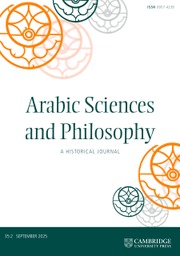Article contents
Philosophy and political thought: reflections and comparisons*
Published online by Cambridge University Press: 24 October 2008
Abstract
Having constituted a new epoch in human history and a new religiouspolitical order, the revealed religions challenged the tradition of Greek philosophy to adjust to, investigate, and make intelligible a religiouspolitical order based on prophecy, revelation, and the divine law. The challenge led certain Arab and Muslim philosophers to reassess the relative distance between the thought of the Greek masters, (Plato, Aristotle, Plotinus, in particular) and the doctrines propagated by the revealed religions, and to make use of such works as Plato's Republic and Laws, rather than Aristotle's Politics, when offering a philosophic account of the new religious–political phenomenon and of such new disciplines as the science of the divine law and the science of revealed theology.
Les religions révélées, en inaugurant une ère nouvelle dans l'histoire humaine et un nouvel ordre “religio-politique”, ont constitué un défi pour la tradition de la philosophie grecque. Celle-ci devait s'adapter a un ordre religio-politique fondé sur la prophétie, la révélation et la loi divine, en faire un objet d'investigation et le rendre intelligible. Ce défi conduisit certains philosophes arabes et musulmans à réévaluer la distance qui sépare la pensée des maîtres grecs (en particulier Platon, Aristote et Plotin) des doctrines propagées par les religions révelées. Il les conduisit aussi à faire usage d'oeuvres telles que la République et les Lois de Platon, plutôt que la Politique d'Aristote dans leur effort de rendre compte philosophiquement du phénomène religio-politique nouveau et des nouvelles disciplines telles que la science de la loi divine et la science de la théologie révélée.
- Type
- Research Article
- Information
- Copyright
- Copyright © Cambridge University Press 1991
References
1 Plato Laws 624a1.
2 Gilson, Etienne, History of Christian Philosophy in the Middle Ages (New York: Random House, 1955), p. 5, where the reader can find the argument against Adolph Harnack on this issue.Google Scholar
3 Heidegger, Martin, An Introduction to Metaphysics, translated by Mannheim, Ralph (New York: Doubleday Anchor Books, 1961), p. 6.Google Scholar
4 Consider Alfarabi's treatment of these questions in The Harmonization of the Opinions of Plato and Aristotle (al-Jamc Bayna Ra'yay al-Hakīmayn Aflāṭūn al-Ilāhī wa-Arisṭūṭālīs), edited and translated into German by Dieterici, Friedrich (Leiden: E.J. Brill, 1890 [text], 1892 [translation]). New edition and English translation by Fauzi M. Najjar, forthcoming.Google Scholar
5 See the reports in Alfarabi's Harmonization cited above, n. 4.
6 “Let everyone,” [Don Quixote] cried, “stand where he is, unless everyone will confess that there is not in all the world a more beauteous damsel than the Empress of La Mancha, the peerless Dulcinea del Toboso.”
“Sir Knight,” [a jester and a very clever fellow from among the Toledan merchants] said, “we do not know who this beauteous lady is of whom you speak. Show her to us, and if she is as beautiful as you say, then we will right willingly and without any compulsion confess the truth as you have asked of us.”
“If I were to show her to you,” replied Quixote, Don, “what merit would there be in your confessing a truth so self-evident? The important thing is for you, without seeing her, to believe, confess, affirm, swear, and defend that truth. Otherwise, monstrous and arrogant creatures that you are, you shall do battle with me”. Cervantes, Don Quixote, translated by Putnam, Samuel (New York: Viking Press, 1949), vol. 1, p. 45.Google Scholar
- 3
- Cited by




